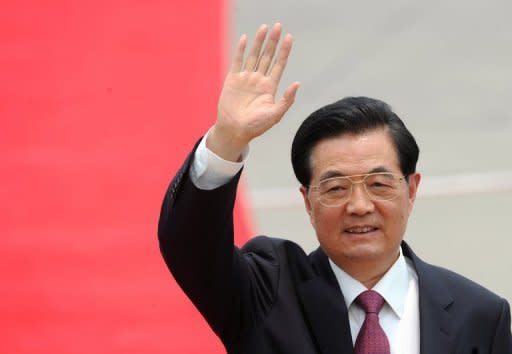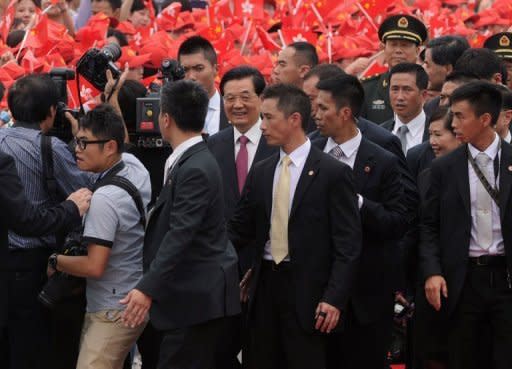China's Hu in Hong Kong for handover anniversary
Chinese President Hu Jintao on Friday urged Hong Kong's restive people to embrace the motherland as he visited the financial citadel for the 15th anniversary of its return to rule by Beijing. Hu, whose three-day visit is his last as president before a key leadership reshuffle in Beijing, will preside over the inauguration of Leung Chun-ying as the city's next chief executive on Sunday. But while he vowed to "walk more" and "see more" in Hong Kong, the first order of business on Hu's trip was a parade in front of the massed ranks of China's secretive military garrison. The president stood to attention in an open-top vehicle, microphones arrayed in front of him, as he moved down the line of People's Liberation Army personnel, tanks and missile launchers in Hong Kong's remote New Territories. "Thank you for your efforts comrades!" Hu, wearing a green uniform, shouted. The PLA members answered with a cry of "serve the people!" A huge banner aloft read "Love the motherland, love Hong Kong". But polls indicate the highest level of anti-China discontent among Hong Kong's seven million populace since the 1997 handover from Britain, and the reaction on social media to the military show was caustic. "It feels like we are in North Korea," one Hong Konger wrote on Facebook. Several groups plan protests for Hu's visit despite a stifling police deployment. A march on Sunday is expected to draw tens of thousands demanding greater democracy and accusing Beijing of interfering in local affairs. Authorities have erected giant barricades measuring more than two metres (6.5 feet) high around Hu's five-star hotel. Well away, one small knot of protestors on Friday kept up a clamour through a loudhailer. Hu's schedule in Hong Kong has not been made known, apparently due to security concerns, apart from his expected attendance at Sunday's inauguration ceremony and a variety show to celebrate the anniversary on Saturday. Prior to the PLA inspection, the Chinese president held a closed-door meeting with outgoing Chief Executive Donald Tsang and thanked him for his service. Tsang is stepping down after seven years in office. His successor Leung was chosen by an election committee stacked with pro-Beijing elites, and many among the ordinary public say they feel disenfranchised amid a widening rich-poor gap and an influx of mainland cash. "In the coming two days, I hope to be able to walk more, see more and personally feel the development of Hong Kong, understand the life and expectations of the Hong Kong people," Hu said on his arrival. He said Hong Kong had achieved "significant" development since the handover and that the "one country, two systems" model, which guarantees the southern Chinese city a semi-autonomous status, had been upheld. Hu, who last visited Hong Kong in 2007 for the 10th handover anniversary, also urged unity between Hong Kongers and their northern neighbours. "The central government would like to use the valuable experience gained over the past 15 years with the people of all sectors in Hong Kong to unite together and look forward to further promote the practice of 'one country two systems'," the Chinese leader said. Under the "two systems" principle, Hong Kong retains its own judicial and financial frameworks, with civil liberties including the right to demonstrate and press freedom not seen on the mainland. Hu is expected to announce measures aimed at enhancing economic cooperation between Hong Kong and Beijing during his visit, as part of China's use of the city as a testing ground to turn the yuan into a global currency. Chinese officials on Friday announced incentives for a financial zone in Shenzhen, close to the Hong Kong border, which will be jointly developed by both sides. It is due for completion by 2020. Despite the closer integration, unease has been growing as Hong Kongers chafe at an influx of newly rich Chinese mainlanders, accusing them of taking everything from school places and maternity beds to baby milk formula. A telephone poll of more than 1,000 people released last week by the University of Hong Kong showed mistrust among Hong Kongers toward Beijing at a new post-handover high of 37 percent. By contrast, a poll released in August 2008 after the Beijing Olympics showed the figure at a relatively low 14 percent, when nationalistic sentiment was strong throughout China. Prior to the handover, mistrust levels stood at 44 percent in May 1997.



